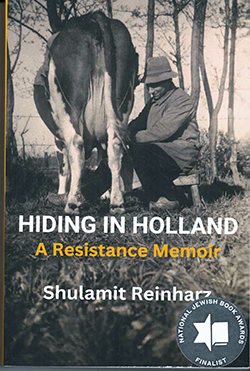Hiding in Holland: A Resistance Memoir by Shulamit Reinharz; Amsterdam Publishers; The Netherlands; © 2024; ISBN 9789493-322707; 317 pages plus appendices; $19.95.

 SAN DIEGO – Reading this book, I was reminded of Natalie Cole’s 1991 recording of “Unforgettable” which, by synchronizing her voice with her late father’s rendition of the song, she performed it in duet with Nat King Cole.
SAN DIEGO – Reading this book, I was reminded of Natalie Cole’s 1991 recording of “Unforgettable” which, by synchronizing her voice with her late father’s rendition of the song, she performed it in duet with Nat King Cole.
Similarly, Shulamit Reinharz seamlessly melded the scattered pages of her father Max Rothschild’s journals and her own commentary into compelling reading about the experience of hiding during the Holocaust.
I can appreciate why this memoir was selected as a finalist for the National Jewish Book Awards. My only complaint about this fascinating reading was the publisher’s choice of typography. Rothschild’s much longer passages were rendered in harder-to-read italics, while daughter Reinharz’s annotations were set down in easier-to-read regular type. As a reader, I would have preferred the opposite presentation.
The boy Max Rothschild grew up in the town of Gunzenhausen, Germany, about which the most salient fact is that it claimed to be the first city to erect a statue of Hitler early into his reign as führer. Max’s life was spared when Jews were rounded up because he was away at a Zionist camp. Before the outbreak of World War II, the Nazis had looked favorably upon Jewish emigration, including to British-controlled Palestine.
From the Zionist camp, Max moved to Holland to participate in a German-approved special program to train youngsters like him to be pioneering farmers in Palestine. The Jewish youth were assigned to individual Dutch farmers, some of whom treated the boys and girls kindly; others who worked them relentlessly. This was prior to the Nazi occupiers actuating their plans to obliterate the Jewish population.
Max decided to go into hiding when the Nazis ordered Jews in 1942 to report for a program they euphemistically called “Harvest Help.” It seemed enticing. Germany had a labor shortage since so many men had been drafted into the Armed Forces. The Nazis lied that Jews who agreed to spend several months picking crops in Germany would become eligible for favorable treatment. Instead, they were deported to concentration camps.
While he wasn’t then aware of the Nazis’ “Final Solution” of the Jewish question, Max was distrustful. Later, he blamed the Allies, particularly the British, who, he said, knew about the Nazi ruse yet hadn’t warned Holland’s Jewish community via BBC broadcast. Accordingly, Max bitterly believed that the British were complicit in the murder of Dutch Jews.
His fiancée Ilse (whom he married after liberation) joined him in hiding. Because she had features that the Nazis mistook as Aryan, she was able to leave the house and run errands. Max, on the other hand, looked stereotypically Jewish, so he never left the home of his idealistic rescuers for a period of three years. He helped the Resistance by writing articles for underground publications. The Schoutens, who risked their lives sheltering Max and Ilse, were subsequently recognized as Righteous Gentiles by Yad Vashem World Holocaust Center.
Following the German surrender, Ilse and Max had two wedding ceremonies – one civic and one Jewish. Between the two ceremonies, Ilse became pregnant with Shulamit. The family seesawed between plans to travel to Palestine (later Israel), where Ilse had one living relative, a sister, and the United States, where Max’s father, a medical doctor, and his mother had become citizens. Ultimately, the family moved to the U.S., where Max later became a rabbi, and the couple made numerous trips to Israel.
Max described the bewilderment and frustration he and Ilse felt after liberation. Neither Palestine (then under British control) nor the United States were guaranteed destinations; the obstacles were daunting for settling as refugees in either place. Nor did Max and Ilse want to return to Germany or stay in Holland because they felt they had no future in either country.
*
Donald H. Harrison is publisher and editor of San Diego Jewish World